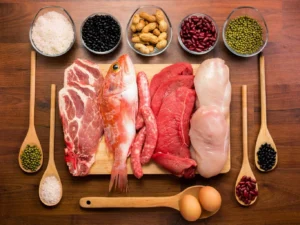Table of Contents
Why Nutrition is Key for Muscle Growth

Muscle-Building Foods: A Comprehensive Guide to Maximizing Gains
Best Muscle-Building Foods to Eat
To build muscle, you need to consume foods that are high in protein and provide essential nutrients for recovery and performance. Here are some of the top muscle-building foods to include in your diet:
1. Chicken Breast
Chicken breast is a lean source of high-quality protein, providing about 22.5 grams of protein per 3.5-ounce serving. It’s low in fat, making it ideal for muscle growth without excess calories. A 2022 study found that chicken protein supplementation, combined with resistance training, significantly increased muscle mass and strength.
2. Eggs
Eggs are a complete protein source, offering all nine essential amino acids. A large egg contains about 6.2 grams of protein. Research shows that consuming whole eggs post-workout can enhance muscle strength and reduce body fat more effectively than egg whites alone.
3. Salmon
Salmon is rich in protein and omega-3 fatty acids, which reduce inflammation and support muscle recovery. A 3-ounce serving provides approximately 21.6 grams of protein. Studies have shown that salmon consumption stimulates muscle protein synthesis after exercise.
4. Lean Beef
Lean beef is packed with protein, iron, and zinc, essential for muscle growth. A 4-ounce serving of grass-fed beef contains about 26.1 grams of protein. A 2024 study found that lean beef promotes muscle protein synthesis more effectively than plant-based meals.
5. Whey Protein
Whey protein is a fast-digesting protein source that aids in muscle repair. One scoop of whey protein powder provides about 25 grams of protein. Research shows that whey protein supplementation, combined with resistance training, significantly increases muscle mass and strength.
6. Greek Yogurt
Greek yogurt is high in protein and probiotics, supporting muscle recovery and gut health. A 7-ounce serving contains about 19.9 grams of protein. Studies have shown that Greek yogurt consumption enhances muscle development when combined with resistance training.
7. Plant-Based Proteins
For vegetarians and vegans, plant-based proteins like lentils, chickpeas, tofu, and quinoa are excellent options. These foods provide essential amino acids and nutrients necessary for muscle growth. For example, a cup of cooked lentils offers about 17.9 grams of protein.
8. Nuts and Seeds
Almonds, walnuts, chia seeds, and flaxseeds are rich in protein, healthy fats, and fiber. A 1-ounce serving of almonds provides about 6 grams of protein. These foods support muscle recovery and provide sustained energy for workouts.
9. Whole Grains
Whole grains like brown rice, quinoa, and oats provide complex carbohydrates and protein. A cup of cooked quinoa contains about 8.1 grams of protein. These foods fuel workouts and aid in muscle recovery.
10. Fresh Produce
Fruits and vegetables are rich in vitamins, minerals, and antioxidants that support muscle function and recovery. While not high in protein, they contribute to overall health, which is essential for effective muscle building.
Foods to Avoid When Building Muscle
Certain foods can hinder muscle growth by causing inflammation, excessive fat gain, or poor nutrient absorption. Here are some foods to limit or avoid:
- Processed Foods: High in unhealthy fats and additives that slow muscle recovery.
- Sugary Foods and Drinks: Cause energy crashes and interfere with performance.
- Alcohol: Impairs muscle protein synthesis and reduces testosterone levels.
- Fried Foods: Contain trans fats that contribute to weight gain without supporting muscle development.
- Low-Protein Foods: White bread, sugary cereals, and processed carbs lack the protein needed for muscle growth.
Other Muscle-Building Considerations
In addition to diet, several factors contribute to effective muscle building:
- Adequate Protein Intake: Aim for 1.2-2.2 grams of protein per kilogram of body weight daily.
- Strength Training: Engage in resistance training at least 3-4 times per week.
- Recovery and Sleep: Get 7-9 hours of quality sleep each night to support muscle repair.
- Hydration: Stay hydrated to aid muscle function and nutrient transport.
- Balanced Macronutrients: Include healthy fats and carbohydrates to maintain energy levels.
Frequently Asked Questions
1. How do you gain muscle fast?
To gain muscle quickly, focus on progressive overload in your strength training, consume enough protein, eat in a caloric surplus, and prioritize recovery and sleep. Supplements like creatine and whey protein can also help.
2. What foods build muscle fast?
The best muscle-building foods include lean meats, eggs, fish, dairy, legumes, whole grains, nuts, and seeds. These foods are rich in protein and essential nutrients.
3. Are 2 eggs enough to build muscle?
Two eggs provide about 12-14 grams of protein, which is beneficial but not sufficient on its own. Combine eggs with other protein sources like chicken, fish, or Greek yogurt to meet your daily protein needs.
4. What should you drink to gain muscle fast?
Protein shakes, whole milk, smoothies, and water are excellent choices. Electrolyte drinks can also help if you’re training intensely.
Conclusion
Building muscle requires a combination of proper nutrition, strength training, and recovery. By incorporating high-protein, nutrient-dense foods into your diet and avoiding processed and sugary foods, you can optimize your muscle growth. For more tips on muscle-building nutrition, visit Healthline.